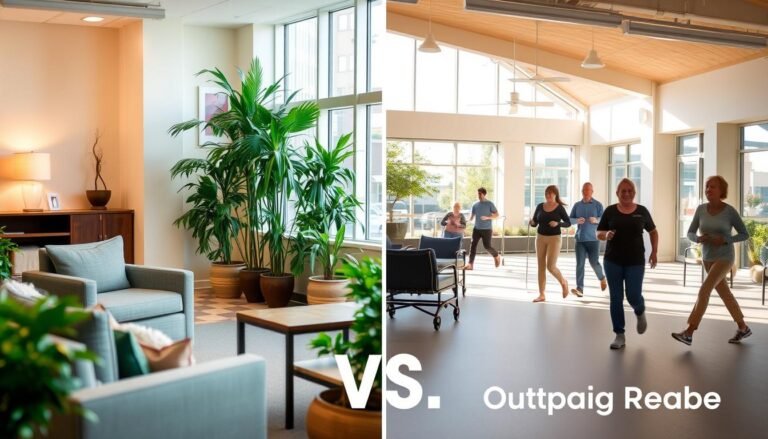Why Outpatient Addiction Treatment Could Be the Solution
Are you struggling with addiction and wondering if outpatient treatment could work for you? Addiction rehabilitation is constantly evolving, offering new approaches to help individuals overcome substance use disorders. Outpatient treatment has emerged as a flexible and effective option for many people seeking recovery.
This approach allows you to maintain your daily responsibilities while receiving professional support. It’s ideal for those who need flexibility and want to stay engaged in their daily lives. Compared to inpatient care, outpatient treatment is more affordable and offers a balanced approach to recovery.
Outpatient programs vary in intensity, from general outpatient sessions to intensive programs. These programs often include therapies like cognitive-behavioral therapy (CBT) and motivational interviewing. The goal is to provide structured support while allowing you to apply coping strategies in real-life situations.
If you’re considering outpatient treatment, it’s important to find a program that fits your needs. For more information on choosing the right program, visit this resource.
Key Takeaways
- Outpatient treatment offers flexibility for maintaining daily responsibilities.
- It’s a cost-effective alternative to inpatient care.
- Programs include various therapies and structured support.
- Outpatient treatment can be tailored to individual needs.
- It helps you apply coping strategies in real-life situations.
Understanding Outpatient Addiction Treatment
Outpatient rehab offers a balanced approach to recovery, allowing individuals to address addiction while maintaining their daily routines. This non-residential program provides flexibility, making it suitable for those with work, school, or family commitments.
What Is Outpatient Rehab?
Outpatient rehab is a structured program where individuals attend scheduled therapy sessions without requiring an overnight stay. These programs cater to various levels of addiction severity, offering tailored support to meet individual needs.
Key Differences from Inpatient Care
Unlike inpatient treatment, outpatient care doesn’t involve round-the-clock supervision. Patients attend sessions during the day or evening and return home. This flexibility allows them to apply coping strategies in real-life situations, promoting long-term recovery.
| Program Type | Duration | Setting | Key Features |
|---|---|---|---|
| Partial Hospitalization | 5-7 days/week | Clinic or hospital | Intensive therapy, medical monitoring |
| Intensive Outpatient Program (IOP) | 9+ hours/week | Outpatient facility | Group therapy, counseling sessions |
| General Outpatient | 1-2 times/week | Outpatient facility | Individual therapy, support groups |
For more information on current trends in addiction rehabilitation, explore updated resources online.
The Role of Flexibility in Your Recovery
Outpatient addiction treatment offers a unique advantage: the ability to integrate recovery into your daily life seamlessly. This approach is designed to accommodate your schedule, whether you’re working, attending school, or caring for your family. The flexibility of outpatient programs ensures that you can seek help without putting your life on hold.
Balancing Daily Life with Treatment
One of the key strengths of outpatient treatment is its adaptability. Programs are structured to fit various lifestyles, allowing you to attend sessions during the day or evening. This balance enables you to maintain your personal responsibilities while actively working on your recovery.
Outpatient treatment programs are available at different levels, from intensive options like Partial Hospitalization Programs (PHP) to more flexible general outpatient sessions. These varying levels ensure that you can choose a program that matches your specific needs and schedule. Whether you’re addressing alcohol use or other substances, outpatient care offers a tailored approach.
| Program Type | Flexibility Features | Support Systems |
|---|---|---|
| Partial Hospitalization | Daytime sessions, structured schedule | Group and individual therapy |
| Intensive Outpatient Program (IOP) | Evening sessions, multiple weekly meetings | Peer support, counseling |
| General Outpatient | Weekly or bi-weekly sessions | Individual therapy, support groups |
The combination of group and individual support in outpatient programs creates a robust network that aids in maintaining sobriety. Sharing experiences in a group setting can foster camaraderie and understanding, while individual sessions provide personalized guidance.
Many individuals have successfully integrated outpatient treatment into their daily routines, attending sessions while managing work and family life. This approach not only aids in recovery but also helps rebuild a sense of normalcy and purpose.
To stay informed about the latest developments in addiction care, consider visiting trusted rehabilitation resources regularly. Outpatient treatment’s flexibility makes it an accessible and effective choice for many seeking recovery.
Types and Levels of Outpatient Programs
Outpatient addiction care offers a variety of structured programs tailored to different needs and lifestyles. These programs provide flexibility, allowing you to maintain your daily responsibilities while working towards recovery.
Partial Hospitalization and Intensive Outpatient Options
Partial Hospitalization Programs (PHPs) are the most intensive form of outpatient care. They typically involve 6 hours of therapy, 5 days a week. PHPs are ideal for those who need rigorous support but don’t require 24/7 supervision. Intensive Outpatient Programs (IOPs) are less intensive, usually consisting of 3 hours of therapy, 3 days a week. Both programs include group and individual counseling, focusing on coping strategies and relapse prevention.
Continuing Care and Aftercare Services
After completing an intensive program, continuing care and aftercare services help you maintain sobriety. These may include weekly therapy sessions, support groups, and regular check-ins with counselors. The goal is to provide ongoing support as you reintegrate into daily life.
| Program Type | Session Frequency | Duration |
|---|---|---|
| Partial Hospitalization | 5 days/week | 6 hours/day |
| Intensive Outpatient | 3 days/week | 3 hours/day |
| General Outpatient | 1-2 times/week | 1-2 hours/session |
Outpatient programs are cost-effective compared to inpatient care, with many insurance plans covering a portion of the expenses. For more details on insurance coverage and program costs, visit this resource.
Family support plays a crucial role in recovery. Many programs offer family counseling to help loved ones understand addiction and how to provide effective support. This collaborative approach strengthens your support network and aids in long-term recovery.
Real-world examples show that individuals in outpatient programs often maintain their jobs and family responsibilities while attending therapy. This balance helps them apply recovery strategies in daily life, promoting sustained sobriety.
“Outpatient treatment offers the flexibility to integrate recovery into your life seamlessly, without putting your responsibilities on hold.”
With various program levels and continuing care options, outpatient treatment provides a comprehensive approach to addiction recovery. It’s a practical choice for those seeking structured support while maintaining their daily routines.
Understanding the benefits-of-addiction-outpatient-treatment
Outpatient treatment is a life-changing option for individuals seeking to overcome substance use while maintaining their daily routines. This approach empowers you to take control of your recovery journey, offering both autonomy and professional guidance.
Gaining Autonomy and Independence
One of the standout advantages of outpatient care is the freedom it provides. You can attend sessions at a time that fits your schedule, allowing you to continue working, caring for your family, or pursuing education. This flexibility fosters a sense of independence, which is crucial for long-term recovery.
By integrating therapy into your daily life, you can immediately apply the strategies learned in sessions to real-world situations. This practical approach helps you build resilience and confidence, which are key to sustaining sobriety.
Leveraging Ongoing Support and Follow-Up Care
Outpatient programs don’t end after the initial treatment phase. They offer continuous support through follow-up care, ensuring you have the resources needed to maintain your progress. Whether it’s through regular check-ins or support groups, you’re never alone in your journey.
Treatment providers play a vital role in monitoring your progress and adjusting your care plan as needed. This personalized approach ensures that your rehabilitation is tailored to your specific challenges, whether you’re addressing alcohol use or other substances.

For those seeking the latest trends in addiction care, visiting trusted resources can provide valuable insights and guidance.
Therapeutic Interventions and Services Offered
Effective therapy is the cornerstone of addiction recovery, offering a blend of traditional and innovative approaches to address substance use disorders. Outpatient programs provide a variety of therapeutic interventions tailored to individual needs, ensuring a comprehensive approach to rehabilitation.
Individual, Group, and Family Counseling
Outpatient programs offer multiple counseling formats to cater to different recovery needs. Individual counseling provides personalized support, helping you address specific challenges. Group therapy fosters a sense of community, allowing you to share experiences and learn from others. Family counseling is also available, helping loved ones understand addiction and provide effective support.
Medication-Assisted and Dual Diagnosis Treatment
Medication-Assisted Treatment (MAT) is often used to manage withdrawal symptoms and reduce cravings, particularly for opioid or alcohol use. Dual diagnosis treatment addresses co-occurring mental health issues, which is crucial for long-term recovery. These services are delivered in outpatient settings, ensuring flexibility and accessibility.
For more information on the connection between mental health and substance use, visit this resource.
Evaluating Cost, Insurance, and Accessibility
When considering outpatient addiction treatment, cost and insurance are critical factors. Understanding these aspects can help you make an informed decision.
Comparing Outpatient and Inpatient Costs
Outpatient treatment is generally more affordable than inpatient care. On average, outpatient programs range from $2,000 to $10,000, while inpatient programs can cost between $6,000 and $60,000 for a 30-day stay. This significant difference makes outpatient care a cost-effective option for many.
| Program Type | Cost Range | Duration |
|---|---|---|
| Outpatient | $2,000 – $10,000 | Varies (e.g., weekly sessions) |
| Inpatient | $6,000 – $60,000+ | Typically 30 days |
Understanding Your Insurance Coverage
Insurance often covers a portion of outpatient treatment costs. For example, Medicaid covers substance use disorder treatment for millions of Americans. Checking your insurance benefits online can provide clarity on what’s covered and what’s not.
- Verify insurance benefits online or through your provider.
- Consider in-network facilities for lower out-of-pocket costs.
- Ask about additional funding options like scholarships or grants.
Accessibility is another key factor. Outpatient programs are often located near patients’ homes, making regular attendance easier. Evening sessions can accommodate work schedules, ensuring you can maintain your daily life while seeking help.
“Cost and insurance factors are crucial in choosing the right treatment provider. Always verify details on reputable websites for the latest updates.”

Selecting a program that fits both your financial and treatment needs is essential. Utilize resource tools and helplines to find the best option for you. Remember, the cost of treatment is often outweighed by the long-term benefits of recovery.
Choosing the Right Outpatient Rehab Center
Choosing the right outpatient rehab center is a crucial step in your recovery journey. With so many options available, it’s important to evaluate your needs and ask the right questions to ensure you find a program that fits your lifestyle and goals.
Assessing Your Treatment Needs
Start by evaluating your personal needs. Consider the severity of your addiction, any co-occurring mental health issues, and your daily commitments. Outpatient programs vary in intensity, so it’s essential to choose one that matches your situation. For example, if you need more structure, a Partial Hospitalization Program (PHP) might be suitable. If you prefer flexibility, an Intensive Outpatient Program (IOP) could be a better fit.
When assessing your needs, think about your schedule. Outpatient treatment sessions can range from a few hours a week to several hours a day, depending on the program. Make sure the program’s schedule aligns with your work, school, or family responsibilities. It’s also important to consider the location of the center—having a facility near your home can make regular attendance easier.
Questions to Ask Potential Providers
Before committing to a program, ask questions to ensure it meets your needs. Here are some key questions to consider:
- What types of therapies and services are offered?
- What are the qualifications of the staff?
- How does the program handle continuing care and aftercare support?
- What is the average patient-to-staff ratio?
- Are there testimonials or success stories from previous patients?
Additionally, ask about the program’s approach to medication-assisted treatment (MAT) if needed, and whether they offer family counseling. These factors can significantly impact your recovery experience.
| Factor | Considerations | Importance |
|---|---|---|
| Program Intensity | Matches your addiction severity and schedule | High |
| Staff Expertise | Qualifications and experience in your specific needs | High |
| Continuing Care | Support after completing the program | High |
| Facility Location | Convenience for regular attendance | Medium |
Remember, taking the time to thoroughly evaluate your options can make a significant difference in your recovery success. For more information on finding the right outpatient treatment program, visit this resource or call this hotline for guidance.
Conclusion
Outpatient addiction therapy has evolved into a versatile and effective solution for those seeking recovery while maintaining their daily lives. This approach offers flexibility, allowing you to balance personal responsibilities with professional support. Outpatient programs provide diverse options, from intensive sessions to general counseling, ensuring a tailored fit for your needs.
The cost-effectiveness of outpatient care makes it an accessible choice, often covered by insurance, reducing financial strain. Combined with personalized plans and ongoing support, it enhances recovery outcomes. Therapy and counseling remain fundamental, helping you build resilience and confidence for long-term success.
Stay informed by visiting trusted sites like addictionhotlinetoday.com, habitrecovery.com, and rehabme.org for the latest updates. Remember, the right treatment is out there—empower yourself to find it and embrace a healthier future.






